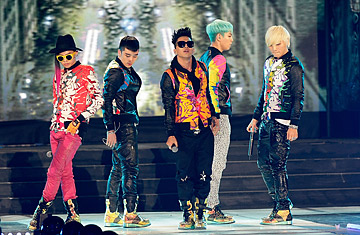
South Korean idol group Big Bang perform on the stage during a concert at the K-POP Fashion Concert on March 11, 2012 in Seoul.
(2 of 2)
Riding the Wave
K-pop's wannabes are no longer groomed for simply the domestic audience. Just as South Korean brands like Samsung and Hyundai have aggressively expanded their overseas markets, the entertainment industry has to look outward if it wants to keep growing. Last year, only 27% of SM Entertainment's revenue came from music sales in South Korea, compared with 42% from overseas royalties and music sales, according to Korea Investment & Securities.
K-pop has had an export drive before. After hallyu — the wave of South Korean music, movies and soap operas — swept Asia in the late 1990s, stars were sent farther afield. But outside Asia, something got lost in translation. Megastar Rain was at the apex of his fame when he performed to a packed house at New York City's Madison Square Garden — but the reviews were snarky. "Seeing him onstage was like watching old MTV videos dubbed into Korean," wrote the reviewer for the New York Times. Ouch.
Today's K-pop is different. To ensure the broadest appeal, English-speaking talent and European and American songwriters have been recruited, and top U.S. producers like will.i.am and Swizz Beatz are interested in the hot products they're pushing. Reports that three of South Korea's best-selling girl groups — Wonder Girls, Girls' Generation and 2NE1 — are scheduled to release English debut albums this year have fans fired up. And after a surprise win at last year's MTV Europe Music Awards for Best Worldwide Act, Big Bang will travel to 25 cities in over a dozen countries on its Alive cavalcade.
Other sectors of South Korean enterprise are keeping a watch on K-pop, hoping that it will change the way young people around the world think about the country. In a recent Korea Trade-Investment Promotion Agency survey, young Europeans were asked what came to mind when they thought of South Korea. "The first thing was North Korea," says Seo Min-soo, a fellow at the Samsung Economic Research Institute in Seoul. "The second was K-pop." Seo notes that a March poll by the Korea Chamber of Commerce & Industry reported that 52% of 300 South Korean companies that were surveyed said their overseas business had already benefited from the K-pop craze. "We have to approach these fans as a new market. They are the trendsetters, and they will have the purchasing power." Seo claims that in Peru, K-pop's cachet helped usher in a 105% jump in South Korean cell-phone sales from 2010 to 2011.
The fanciful connection between pop and handset sales is, of course, impossible to verify. But for now, it seems that all of Seoul has bought into the hype. The Korea Tourism Organization estimates that this year alone, 1 million hallyu-loving tourists will visit the country. The government plans to build a K-pop-only concert hall in the Seoul area. The city of Osan, on Seoul's outskirts, has teamed up with SM Entertainment to develop a K-pop academy to "foster and train" rising stars. "Most countries want to support their artists, but this is a national trophy," says Mats Brandt, the president of Live Nation's Far East division. "There's a lot of pride."
In Seoul, the only thing more palpable than pride is ambition. On one cold afternoon, class lets out at the Seoul School of Performing Arts, and students burst into the gray day in their yellow jackets. Ahn Ji-hee, a talent scout from FNC Music, stands on a corner and zeroes in on a boy with shaggy hair, who becomes aware of her. "He's cute, but I'm not sure," she mutters, stamping her feet on the freezing sidewalk. After a few minutes, he takes the hint and wanders away with a pack of fellow students. Tomorrow, both student and scout will try again. Maybe, if they are lucky, another K-pop star will be born.
— with reporting by Sungha Park / Seoul
